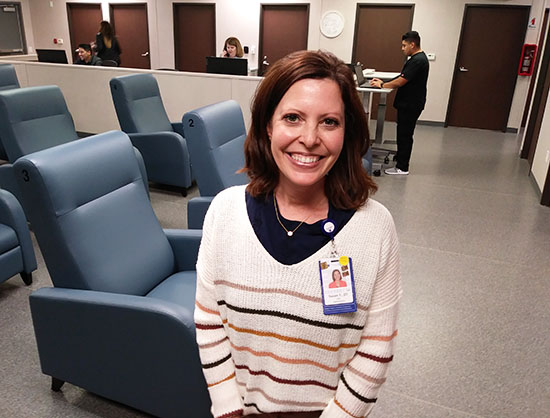In the Spotlight: Susan Taylor

Susan Taylor is President/CEO at College Hospital Costa Mesa, a 122-bed privately-owned facility. Of that total, 104 are locked, LPS-designated psychiatric care beds. Early this year, College Hospital became the latest of a handful of Southern California locations to open a Crisis Stabilization Unit. Across the region, only about half a dozen county-funded units are open. More are needed — to care for the tens of thousands of residents who experience mental and behavioral health challenges – and who mainly turn to hospital EDs for care.
Taylor sat down with HASC Strategic Communications to reflect on the ongoing pandemic and to recount her push to open one of the region’s first CSUs – an achievement reached in February.
The interview is part of In the Spotlight — a HASC series profiling people connected to the association pursuing innovative, impactful work in their communities.
Almost all HASC member facilities have been stretched in response to COVID-19. What’s it like delivering care to people experiencing mental health and substance use challenges during this extraordinary period?
The COVID-19 pandemic has created mental health and substance distress and I’m so thankful that our inpatient, outpatient and Crisis Stabilization Unit facilities have remained open for our community during this challenging time. Our staff at CHCM/CSU are true heroes who show up and are committed to caring for our patients without hesitation. As such, our hospital has remained full. We have, however, seen a slight decrease in our CSU utilization over the past few months. This may be attributable to individuals being fearful of seeking care. With a universal masking protocol in place (patients included) along with very stringent cleaning and screening guidelines, our patients can rest assured that they are receiving safe care at our CSU.
Thanks for showing us around the unit. Tell us in your own words what a visitor would see and experience here.
The College Hospital Crisis Stabilization Unit is an outpatient psychiatric urgent care facility with the capacity to treat 12 adult patients. The CSU is located on the hospital campus of College Hospital Costa Mesa and is approximately 2,888 square feet in size. The facility is nicely decorated to ensure a warm and comforting environment. It’s furnished with reclining chairs located directly in front of an open nurses’ station. While receiving care in the CSU, patients have access to a shower, washer/dryer, lockers for personal belongings and a kitchen area. Security for the unit is available at all times. We received our LPS designation in March and began caring for involuntary patients at that time.
From a hospital operations perspective, what kind of medical and psychiatric resources are in the unit? How many staff and what levels of training and certification? What official specifications guide CSU operations?
The CSU provides crisis stabilization to individuals in severe distress with up to 23 hours of supervised care to assist with de-escalating the severity of their crisis and/or need for urgent care. The goal is prompt stabilization within the CSU environment and avoidance of unnecessary hospitalizations. Treatment modalities within the CSU include, but are not limited to the following:
- Prescribing and administering psychopharmacologic agents targeted to acute symptoms.
- Review, prescribing and possible adjustment of the patient’s outpatient psychiatric medications.
- Psychotherapy, including crisis, supportive, milieu and group therapies.
- Psychosocial assessment.
- Discharge planning and linkages to community partners.
- Family and collateral involvement.
The CSU provides appropriate physical care, prescription of medications and interventions for medical illnesses to the capability of the facility including an assessment, laboratory, radiology and other testing as determined by the onsite attending physician. The unit is certified by the Department of Healthcare Services (DHCS) and the requirements for a CSU are set forth in Title 9 of the California Code of Regulations. Staffing ratios are also set by the California Code of Regulations and consist of physicians, psychiatric nurse practitioners, registered nurses, licensed clinical social workers, licensed vocational nurses, and mental health workers.
How much work and extra hours have you allotted to the project? What motivates you?
My work began several years ago when Scott Zeller, MD (a speaker at HASC’s 2018 Annual Meeting) started educating the California behavioral health care community about this new model of care. The concept was that patients experiencing a psychiatric crisis could receive care in other settings aside from an Emergency Department or an inpatient psychiatric unit. As I learned more, I became motivated by the fact that there are many medical urgent care facilities located in Orange County, but only one psychiatric urgent care facility (the Orange County Healthcare Agency CSU). My vision was to create a second psychiatric urgent care facility in order to improve access to this level of care for patients. My team and I have worked tirelessly to accomplish our goal and we are very proud of the end result!
Was there any hesitancy on the part of staff to take on this new and somewhat public role in the community?
I have perceived no reticence on the part of my staff. On the contrary, I have witnessed a groundswell of staff excitement and willingness to take the lead in being a part of the project. My team recognizes the need in Orange County for CSUs. Individuals experiencing a psychiatric crisis can now present to a CSU in lieu of going to the Emergency Department for psychiatric care. Our staff are highly skilled and trained in behavioral health, substance abuse and the social determinants of health which accompany these conditions such as homelessness, domestic violence and/or food insecurity. These are issues that our team will assist our patients with while they are in the unit and we believe that it is a privilege providing care to these individuals.
If you had two minutes to deliver an ‘elevator speech’ to another hospital executive on setting up a CSU, what would you say?
There are many logistics, both operational and financial, that are involved in establishing this type of facility. An understanding of the reimbursement from the county is crucial. It is also important to understand the certification and designation requirements, along with any city codes that may be applicable to the facility. Significant analysis and planning must be performed. However, all of this work is well worth it in the end – patients experiencing a psychiatric crisis deserve this level of care and it is incumbent upon health care leaders like us to create it for them.
Contact:
Erik Skindrud
(213) 538-0728
eskindrud@hasc.org



